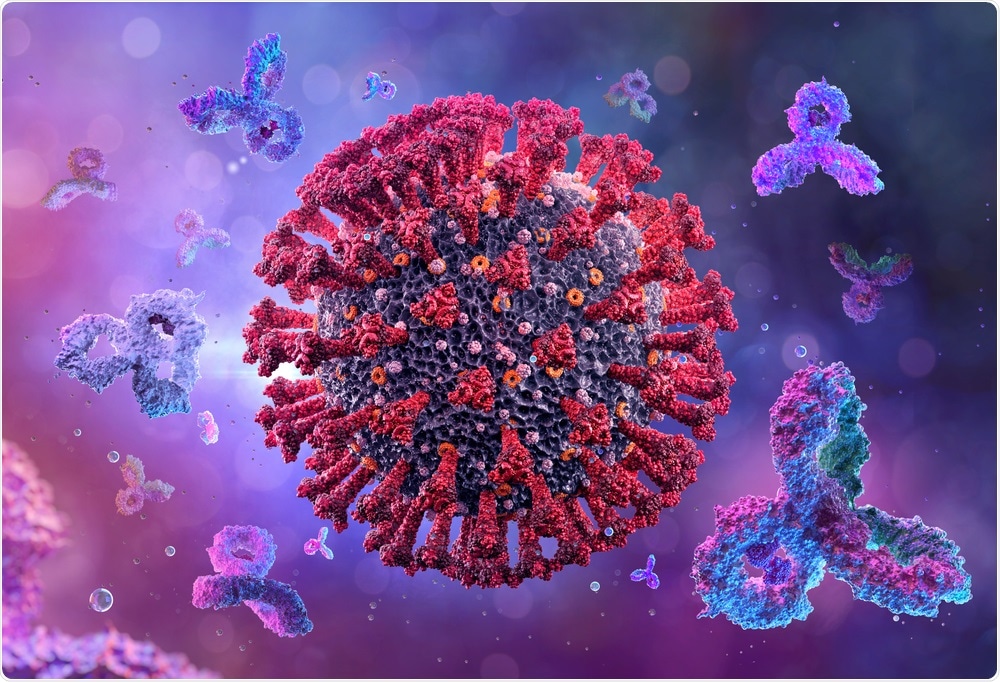Researchers from Duke-NUS Medical School, the National Centre for Infectious Diseases (NCID), and the Agency for Science, Technology, and Research (A*STAR) Infectious Diseases Labs have discovered that antibodies against SARS-CoV-2 decline at different speeds, and these antibodies last for only a few days in some people but remain for many years in other individuals.

SARS-CoV-2. Image Credit: Corona Borealis Studio/Shutterstock.com
Published in The Lancet Microbe journal, the study demonstrates that the severity of the COVID-19 infection could be a deciding factor in harboring antibodies that last for a longer time. People who have low levels of neutralizing antibodies may still be protected from the COVID-19 infection if they have strong T-cell immunity.
The researchers tracked 164 COVID-19 patients in Singapore over a duration of six to nine months and assessed their blood for neutralizing antibodies against T cells, SARS-CoV-2, and immune system signaling molecules. They later utilized this data to determine a machine-learning algorithm to estimate the trajectories of the neutralizing antibodies in individuals over time.
The key message from this study is that the longevity of functional neutralizing antibodies against SARS-CoV-2 can vary greatly and it is important to monitor this at an individual level. This work may have implications for immunity longevity after vaccination, which will be part of our follow-up studies.”
Wang Linfa, Study Corresponding Author and Professor, Emerging Infectious Diseases Programme, Duke-NUS Medical School
The researchers were able to classify people into five groups based on the duration of their antibodies. The first group, also known as the “negative’ group and who never developed detectable neutralizing antibodies, comprised 11.6% of the patients in the analysis.
The “rapid waning” group, which comprised 26.8%, had varying preliminary levels of antibodies that declined rapidly. The “slow waning” group, which comprised 29%, mostly tested positive for antibodies at six months.
The “persistent” group, which comprised 31.7%, had a slight change in their antibody levels for up to 180 days and, lastly, the “delayed response” group, which comprised 1.8%, displayed a marked increase in neutralizing antibodies at the time of late convalescence.
Although this research work targeted at establishing the concentrations of neutralizing antibodies, which happen to be a part of the immune defense system of the body, the other significant feature of an effective immune defense is the immunity of T-cells.
The study noted that individuals who were tested, such as those from the “negative group,” showed sustained T-cell immunity six months following the initial infection. This demonstrated that people may still be protected if they have strong T-cell immunity and even when they have a low level of neutralizing antibodies.
Our study examines neutralizing antibodies which are important in protection from COVID-19. We found that antibodies against SARS-CoV-2 wane in different people at different rates. This emphasizes the importance of public health and social measures in ongoing pandemic outbreak response. However, the presence of T-cell immunity provides hope of longer-term protection which will require more studies and time for epidemiological and clinical evidence to confirm.”
David Lye, Associate Professor and Director, Infectious Disease Research and Training Office, National Centre for Infectious Diseases
Lye is also the corresponding author of the study.
This study reminds us that we all react differently to infection and that various people mount different protective immune responses. Understanding the basis of these differences will help build better vaccines."
Laurent Renia, Professor and Executive Director, Agency for Science, Technology and Research Infectious Diseases Labs
The results are crucial as policymakers design pandemic exit strategies and vaccination programs. The rate at which antibodies decline indicates that re-infection may happen in the following waves of infection.
Moreover, if immunity given through vaccinations reduces similar to antibodies that are produced naturally, then yearly vaccine administration would be needed to prevent future COVID-19 outbreaks. Additional studies will be required to elucidate this concept as vaccine programs are rolled out.
Source:
Journal reference:
Chia, W. N., et al. (2021) Dynamics of SARS-CoV-2 neutralising antibody responses and duration of immunity: a longitudinal study. The Lancet Microbe. doi.org/10.1016/S2666-5247(21)00025-2.